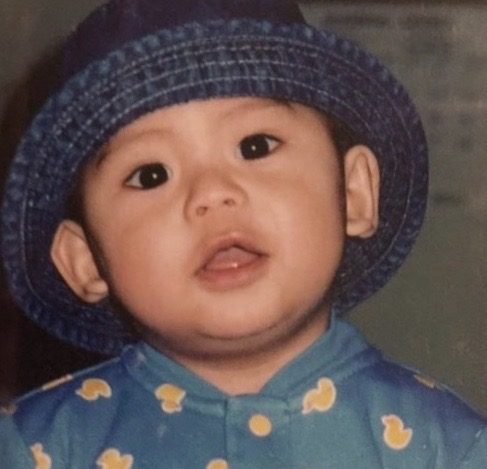Oh, what’s in a name?: Shining a light on middle names
October 28, 2019

Joshua Marc Tan Sunglao stares in wonderment as his mom takes the picture.
John F. Kennedy. Mohandas K. Gandhi. Anderson W. Clark. Most people have middle names, but not that many people like to share these additional names primarily because it seems that middle names carry a bad rep. But why? Why are middle names left on the back burner?
Middle names were created because the people in the middle ages couldn’t decide whether to put their child’s name of a saint or a family name. In the end they decided to to put the child’s name followed by their baptismal name, then the surname. It was also said that multiple names represent royalty. Over time, middle names became names of anyone rather than their religious name.
Middle names also are used to differentiate the seniors and juniors in their family. Sophomore Frank Jacob Murguia says that his mother chose the name Jacob in order to tell his father and himself apart, but he also said that he wouldn’t switch his first and middle name to individualize himself from his father.
AP US History teacher Eric Ryan Kursinski says that he was named to avoid commonalities between his father and grandfather. “My father’s name is Emil Robert Kursinski, and when my dad was born, he was Emil Robert Kurisinski Jr.,” Kursinski said. “My grandfather went by ‘Bob’ and my father went by ‘Rob,’ so what was I going to go as? And my mom hated the name, but she decided to keep the initials.”
Several Filipinos have a tradition to use their parents’ middle name as their own. Junior Joshua Marc Tan Sunglao say that he takes pride in sharing the same middle name as his father. “It is unique to me,” Sunglao said.
Unlike Sunglao, sophomore Christine Ngoc Nguyen says that she got her middle name from her mother, but doesn’t like it due to the fact that no one can pronounce it properly. “I can’t even pronounce it and no one knows what it means,” Nguyen said.
Not every country uses middle names, but there are sometimes restrictions for countries that do. In New Zealand, the child’s name can’t be anything offense, or unreasonably long. In several Middle Eastern countries, the middle name is the father’s name, and it doesn’t matter what gender the kid is. Denmark has a list of 7,000 names for parents to choose from, so the child does not have a name like Pluto.

In most Latin American countries, they use combined names rather than middle names. They commonly use one chosen name and saint name for their kid. Some countries like Italy use additional names rather than middle names and aren’t used on official documents.
Today many families with mixed heritages like to create a middle name that identifies with their culture. Junior Parvaneh Havana Motallebi says that because she is half Cuban and half Iranian, her parents wanted to choose a middle name that would tailor to both ethnicities. “Since my first name is Iranian, then my parents decided to make my middle name Cuban,” Motallebi said. “So, they chose Havana because they went on a trip to Havana.”
Although before the American Revolution only 5 percent of people had middle names, as of 2013, 80 percent of Americans have a middle name. But what about the 20 percent of the population that lacks the additional name?
Senior Anita Hovespian says that she wasn’t given a middle name because it would be too long, and, besides, she wouldn’t want to legally add one either. “I feel like the way my name is, like Anita Hovespian. If I change it, it won’t be like who I was since day one,” Hovespian said.
Recent studies say that using the middle initials will make people think that the person has a higher social status. In one study, subjects were given names of people with or without middle initials and asked which names had a higher status. At the end of the study, the majority of the subjects chose the name using the initials. “It sounds more professional to have that middle initial and makes you sound more prestigious,” Kursinski said.
So why is there an unspoken rule not to discuss a middle name? Over the years, middle names have been labeled as “different” or completely unrelated to the first name. “I feel like all middle names get this rep, and it’s like a random thing they put in there to throw you off,” Motallebi said. “But I still wouldn’t change it because no matter how different it is, it is still a part of me.”